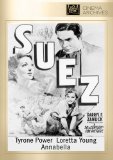| Reviews & Columns |
|
Reviews DVD TV on DVD Blu-ray 4K UHD International DVDs In Theaters Reviews by Studio Video Games Features Collector Series DVDs Easter Egg Database Interviews DVD Talk Radio Feature Articles Columns Anime Talk DVD Savant Horror DVDs The M.O.D. Squad Art House HD Talk Silent DVD
|
DVD Talk Forum |
|
|
| Resources |
|
DVD Price Search Customer Service #'s RCE Info Links |
|
Columns
|
|
|
Suez (Fox Cinema Archives)
Beautifully-produced biopic hooey. Hard-core movie lovers know that the studios' M.O.D. (manufactured on demand) services initiated by Warner Bros.' successful Archive Collection have been an absolute boon to those looking for difficult-to-find library and cult titles not considered commercially viable for mass-market disc printing. So along with Warners, Sony's Columbia vaults and M-G-M, 20th Century-Fox joins the M.O.D. market with their Cinema Archives line―and a most welcome addition it is. I'll be reviewing several of their introductory titles this week, and next up (after yesterday's Way of a Gaucho) is Suez, the 1938 blockbuster biopic from Fox starring their newest and soon to be biggest superstar, Tyrone Power, along with Loretta Young, the French actress (and soon to be Mrs. Power) Annabella, and a host of familiar character actors. Purportedly about the life and struggles of Ferdinand de Lesseps, the French diplomat who built the Suez Canal and loved the beautiful French Empress Eugenie, Suez is about as historically accurate as the majority of golden age Hollywood biopics―in other words, not at all. But frankly who cares? It's entertaining as hell. No extras for this nice-looking black and white transfer.
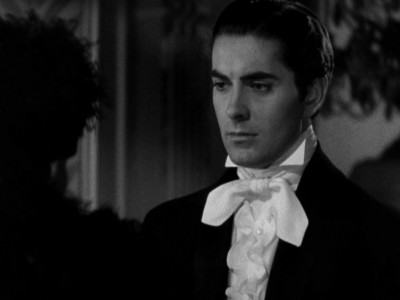
In 1850 Paris, promising French diplomat Ferdinand de Lesseps (Tyrone Power) only has eyes for the lovely Countess Eugenie de Montijo (Loretta Young) of Madrid. So, too, does Louis-Napoleon Bonaparte (Leon Ames), President of the French Republic and nephew to the deceased emperor, who knows a too-handsome rival in love when he sees one in the dreamy de Lesseps. Quick as you can say, "Mon dieu!" de Lesseps is shuttled off to Egypt, where his father, Count Mathieu de Lesseps (Henry Stephenson) is the Consul-General―but not before de Lesseps impetuously implores Eugenie to marry him...which she of course doesn't, considering de Lesseps is a nobody. Once in Egypt, de Lesseps meets French wildcat Toni Pellerin (Annabella), who has followed her grandfather, Sergeant Pellerin (Sig Ruman), at camp. A chance ride out into the dunes after a rainstorm gives de Lesseps an inspiration: a canal built between the Red Sea and the Mediterranean. To do this, though, de Lesseps must negotiate the tricky waters of international politics through his friendships with crafty English Consul-General Sir Malcolm Cameron (Nigel Bruce), wise Viceroy Mohammed Ali (Maurice Moskovitch) and his nephew, dopey Prince Said (J. Edward Bromberg), the blunt British Prime Minister (George Zucco), who sees such a canal as a threat to England's supremacy, and of course Louis-Napoleon, now Emperor Napoleon III, who has grown increasingly close to Eugenie, and who has brought France to the brink of civil war.
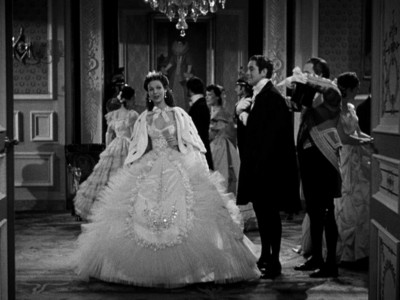
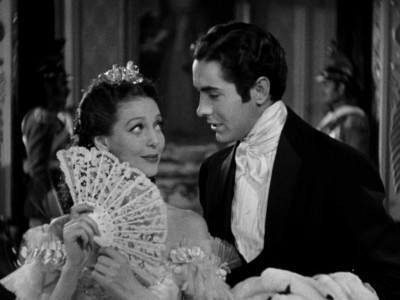
I didn't remember a thing about the building of the Suez Canal from my college class in Modern European history, so I went back and did a cursory flip through some net sources and discovered that basically, Suez spells de Lesseps name right and that's about it. Apparently, the descendents of de Lesseps actually sued Fox back 1938 for defamation of character when the movie came out (they lost), such was the level of invention here in Philip Dunne's (How Green Was My Valley, The Robe, The Egyptian, and Julien Josephson's (Disraeli, Heidi, Wee Willie Winkie, Stanley and Livingstone) script. I would imagine by now it's fairly common knowledge with most serious moviegoers that Hollywood biopics played (and still play) fast and loose with the facts, so anyone going into Suez hoping to crib a term paper on de Lesseps the night before it's due is out of luck here. As with any genre exploited by the factory-like movie studios in Hollywood's golden age, story frameworks and conventions that proved popular with audiences were quickly drawn up and then adhered to fairly rigidly (which only helped to further streamline the production phase), with biopics fairing no differently in this combination of aesthetic and financial regimentation. The studio executives and producers cared little if the actual biographical facts of their intended historical figures didn't match up with their "great man, great struggles, great love" fictional triangles; if those elements didn't exist, they were fashioned out of whole cloth by the screenwriters on payroll and to hell with the truth. That's why you can watch studio biopics from this period covering a diverse range of personalities like Disraeli, Pasteur, and Strauss...and come away with the odd (and wonderfully silly) feeling that they all led basically the same life.
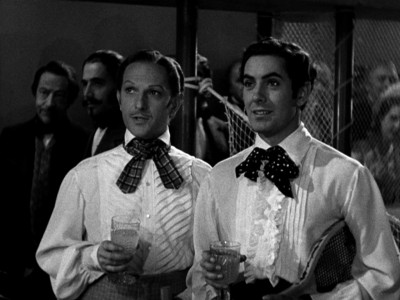
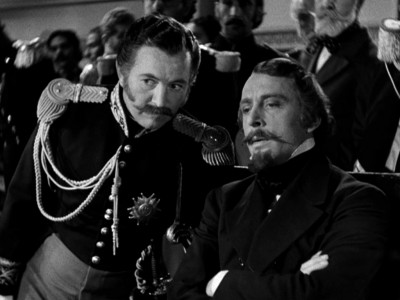
And when box office numbers and critical reviews were tallied up, who can blame the studios for cranking out these biopics such as Suez like so many well-dressed sausages? Certainly Suez's 20th Century-Fox, as led by Darryl Zanuck, had a good reason to stick with this genre, since Zanuck had for years excelled at producing biopics. When Zanuck was production chief for Warner Bros. during the late 20s and early 30s, he had personally shepherded several smash biopics starring the first king of the genre, stately actor George Arliss (Disraeli, Alexander Hamilton, Voltaire), before bringing his biggest star along with him to the newly created Twentieth Century Films (the precursor of 20th Century-Fox) where they made more biopic hits like The House of Rothschild and Cardinal Richelieu. Other studios of course exploited the genre, too, with Metro-Goldwyn-Mayer winning the Best Picture Oscar for The Great Ziefeld in 1936, and Warners clinching the Academy Award for their smash, The Life of Emile Zola, the following year. Couple that impulse, then, to continually re-mint a proven formula at the box office, with tweaks to the form for novelty (Suez's fun special effects-laden "disaster" finale worked well in previous hits like M-G-M's San Francisco and The Good Earth, as well as Fox's and Power's 1937 hit, In Old Chicago), along with reteaming stars audiences liked together (Power and Young had just scored with the Fox comedy, Café Metropole), and a movie like Suez couldn't help but get made...regardless of whether or not it had anything to do with the real life of its subject.
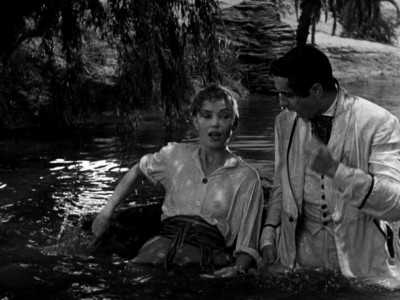
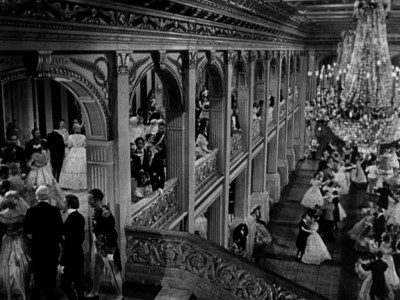
As for Suez the movie, it's an excellent example of the strengths of the Hollywood biopic as produced during this particular time period. Some reviewers disavow these efforts right off the bat simply because they're largely fictitious exercises. But most moviegoers, then and now (despite elitist yelps to the contrary by those who think they know better), were smart enough to recognize stock, repeated forms and dynamics in these Hollywood entertainments. They went to see and dream about the pretty Loretta Young and the more gorgeous Ty Power, and the sumptuous costumes and the elaborate special effects, when they went to something like Suez. They didn't go for a history lesson (and chances are they didn't retain any of that "history," anyway). Those stock situations of the genre―the doomed love triangle, the notion of a "great man" suffering personally and romantically to succeed materially, the cameos of other historical figures walking through the plot―may not have as many admirers today, but I find them delightfully stylized by their very ritualization and repetition throughout all their various studio incarnations, particularly when they're carried off so well in the case of Suez (show a snooty American culture snob some formalized kabuki and they piss all over themselves; show them a formula Hollywood biopic from the 30s like Suez and all they can do is sneer at the "clichés").
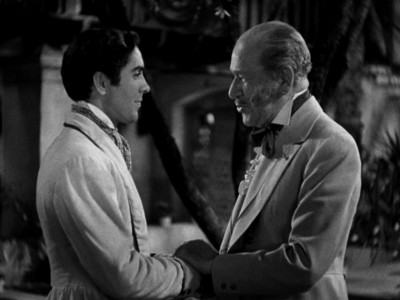
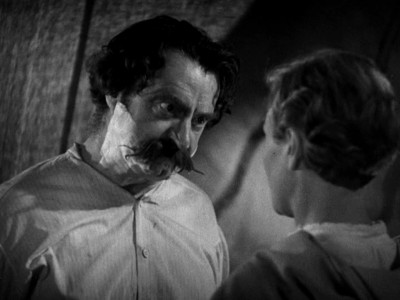
With an A-list budget at hand, Suez has that heft and sheen and most importantly, that confidence of an unself-conscious Hollywood blockbuster that smoothes over its rough spots. Sure, Annabella's performance is annoying as hell (at 30-years-old, she's 15 years too old to be playing the character the way she does―as if Toni were a French-fried Gidget, all arms and legs flailing, trying to madly paw at Power). And where does Young go during the middle and end of the picture, when we're all primed for some guilty romantic reunions and recriminations between her and Power? Under iron man Allan Dwan's stately, assured (but still speedy, perhaps thanks to legendary editor Barbara McLean?) direction, however, one doesn't spend too much time dwelling on these shortcomings. Dwan keeps Suez's bogus story moving along at a sure clip, while eliciting sometimes broad (deliciously hammy Sig Ruman, J. Edward Bromberg, and Nigel Bruce), sometimes quite subtle (Sidney Blackmer, Maurice Moskovitch, Leon Ames, Joseph Schildkraut) performances from the cast. Power, by now a box office sensation and Fox's most important new star, may not have much variation in his performance at this early stage of his movie career, but as always with this vastly underrated performer, there's a mysterious stillness, an inner repose and gravity under those impossibly handsome black Irish looks, that instantly spell "star quality" anytime he's on the screen. Forgetting the impressive pomp and sumptuousness of Suez, and the entertaining silliness of its stock biopic conventions, that star quality alone―back when those elusive, unobtainable stars were more like gods to their devoted fans―is probably worth Suez's ticket alone.
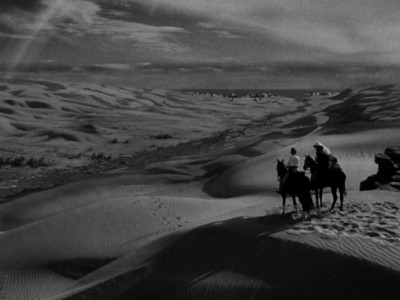
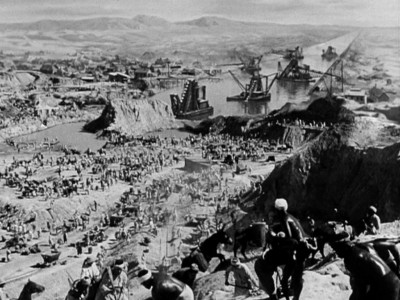
The DVD:
The Video:
Except for the expected grain, the full-screen, 1.37:1 transfer for Suez looks quite good, with relatively strong blacks, good, consistent contrast, and a sharp image (the image becomes window-boxed anytime a title card pops up).
The Audio:
The Dolby Digital English mono audio track is just fine, with low hiss and clean dialogue. No subtitles or closed-captions.
The Extras:
No extras for Suez.
Final Thoughts:
Sure it's fictional hooey...that's why I like it. I want to see what it really took to build the Suez Canal? Booooorrrrrriiiiiing. I want to look like Ty Power, and romance Loretta Young. I want my life's adventures to be emotionally pat and attractively photographed. I want fantasy. Not reality. That's why I'm watching a Hollywood biopic. And Suez is an excellent example of the genre. I'm highly, highly recommending Suez.
Paul Mavis is an internationally published movie and television historian, a member of the Online Film Critics Society, and the author of The Espionage Filmography.


|
| Popular Reviews |
| Sponsored Links |
|
|
| Sponsored Links |
|
|
| Release List | Reviews | Shop | Newsletter | Forum | DVD Giveaways | Blu-Ray | Advertise |
|
Copyright 2024 DVDTalk.com All Rights Reserved. Legal Info, Privacy Policy, Terms of Use,
Manage Preferences,
Your Privacy Choices | |||||||









